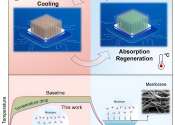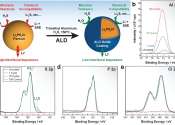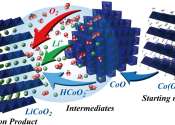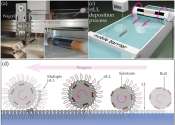Salt solution cools computers, boosts performance
Researchers at the City University of Hong Kong found the secret to a more efficient, less expensive approach to keeping massive computer systems cool: Just add salt.
Hardware

Researchers at the City University of Hong Kong found the secret to a more efficient, less expensive approach to keeping massive computer systems cool: Just add salt.
Energy & Green Tech

A coating technique long used in manufacturing of computer chips can potentially enable a battery to charge many more times over its lifetime and make it much easier to manufacture. Scientists at the U.S. Department of Energy's ...
Nov 1, 2023
0
104
Business

South Korea's Samsung Electronics said Tuesday that its operating profits for the July to September period were down nearly 80 percent, but forecast that a prolonged slump in the memory chip market was coming to an end.
Oct 31, 2023
0
1
Energy & Green Tech

Lithium thionyl chloride (Li-SOCl2) batteries use a liquid thionyl chloride (SOCl2) electrolyte to give the battery superior energy density and stability, long life and low levels of energy loss during storage.
Oct 27, 2023
0
10
Energy & Green Tech

Solar cell efficiency has soared in recent years due to light-harvesting materials like halide perovskites, but the ability to produce them reliably at scale continues to be a challenge.
Oct 26, 2023
0
36
Energy & Green Tech

Layered lithium cobalt oxide, a key component of lithium-ion batteries, has been synthesized at temperatures as low as 300°C and durations as short as 30 minutes.
Oct 24, 2023
0
74
Engineering

Organic semiconductor materials are promising key technologies for the development of state-of-the-art optoelectronic components and are used in photovoltaics as well as in sensor technology and microelectronics. In order ...
Oct 19, 2023
0
59
Business

A tech company that specializes in electronics manufacturing has revealed plans to slash well over 100 jobs in the East Bay, a fresh round of layoffs to jolt the Bay Area's wobbly technology sector.
Oct 19, 2023
0
18
Business

The European Central Bank moved closer to creating a "digital euro" Wednesday by greenlighting the next stage in the project, even as questions persist about the potential benefits and risks.
Oct 18, 2023
0
2
Business

Apple chief Tim Cook made a surprise visit to China this week, greeting gamers in the southwestern city of Chengdu as his company faces slumping phone sales in its biggest market.
Oct 17, 2023
0
53
Electronics is a branch of science and technology that deals with the flow of electrons through nonmetallic conductors, mainly semiconductors such as silicon. It is distinct from electrical science and technology, which deal with the flow of electrons and other charge carriers through metal conductors such as copper. This distinction started around 1906 with the invention by Lee De Forest of the triode. Until 1950 this field was called "radio technology" because its principal application was the design and theory of radio transmitters, receivers and vacuum tubes.
The study of semiconductor devices and related technology is considered a branch of physics, whereas the design and construction of electronic circuits to solve practical problems come under electronics engineering. This article focuses on engineering aspects of electronics.
This text uses material from Wikipedia, licensed under CC BY-SA